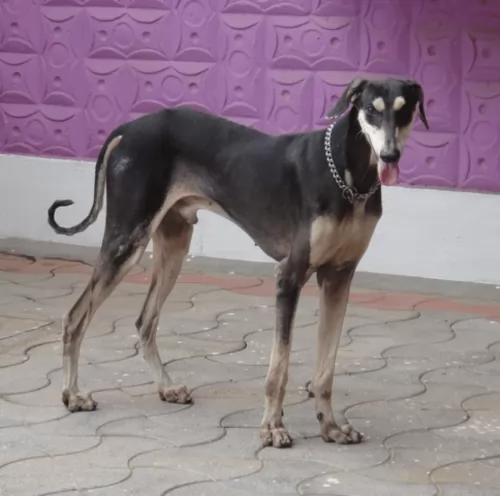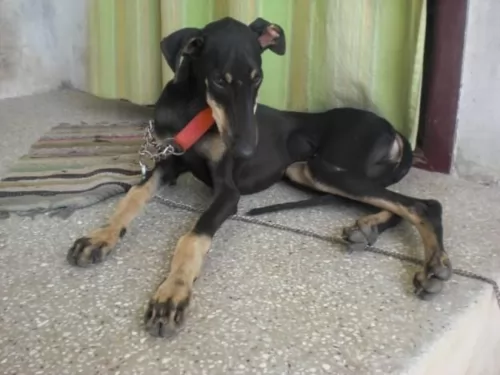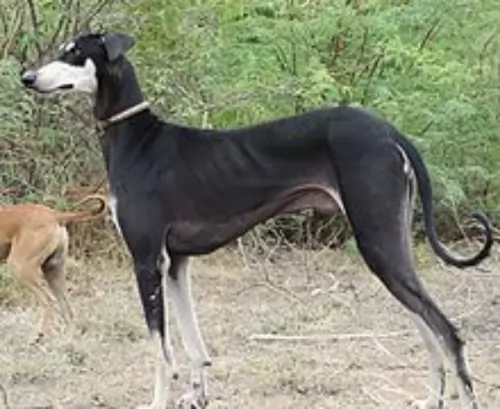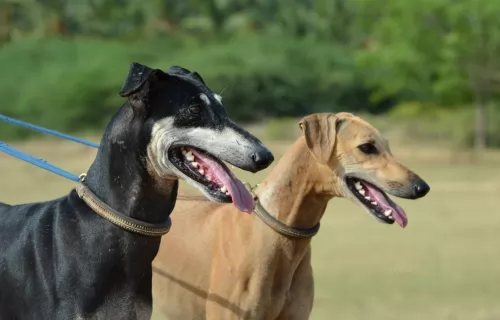 Petzlover
Petzlover Blue Picardy Spaniel is originated from France but Kanni is originated from India. Blue Picardy Spaniel may grow 6 cm / 2 inches shorter than Kanni. Both Blue Picardy Spaniel and Kanni are having almost same weight. Blue Picardy Spaniel may live 3 years less than Kanni. Both Blue Picardy Spaniel and Kanni has same litter size. Blue Picardy Spaniel requires Moderate Maintenance. But Kanni requires Low Maintenance
Blue Picardy Spaniel is originated from France but Kanni is originated from India. Blue Picardy Spaniel may grow 6 cm / 2 inches shorter than Kanni. Both Blue Picardy Spaniel and Kanni are having almost same weight. Blue Picardy Spaniel may live 3 years less than Kanni. Both Blue Picardy Spaniel and Kanni has same litter size. Blue Picardy Spaniel requires Moderate Maintenance. But Kanni requires Low Maintenance
 The Blue Picardy Spaniel is a direct descendent of the French spaniel. It was in the 14th century that recorded descriptions of the French ‘setting dogs’ emerged but it is believed that the spaniel originated before that.
The Blue Picardy Spaniel is a direct descendent of the French spaniel. It was in the 14th century that recorded descriptions of the French ‘setting dogs’ emerged but it is believed that the spaniel originated before that.
The spaniels separated into different regional types where size and colour varied according to the region they were in. It was developed in the northern part of France and bred with Gordon- and English Setters, resulting in a Belton blue color, which is a type of blue ticking coloration. The dog was recognized as a separate breed in France in 1938.
 The Kanni dog is a rare South Indian Sighthound. It is also known as the Maiden's Beastmaster and this is because it is known to be protector and defender of its owner's property.
The Kanni dog is a rare South Indian Sighthound. It is also known as the Maiden's Beastmaster and this is because it is known to be protector and defender of its owner's property.
During ancient times, the dog was used for hunting but today it is essentially kept as a pet and it is registered with the Kennel Club of India.
 The medium-sized, well muscled Blue Picardy Spaniel has such an amicable expression on his face with such gentle brown eyes that it is difficult to think of him as a gun dog. He is often described as a quiet dog, but lots of fun. He has long legs and stands about 56–61 cm high at the withers, weighing about 19–20 kg. His speckled grey-blue coat with black patches is medium length and wavy and you’ll find typical Setter feathering on the legs, the tail and underside. The medium-length, drooping ears are also covered in silky, feathery hair, a blue/grey coat with black patches and has long feathering on the belly, legs, ears and tail. When the puppies are born they’re white with black patches, but this changes as they mature.
The medium-sized, well muscled Blue Picardy Spaniel has such an amicable expression on his face with such gentle brown eyes that it is difficult to think of him as a gun dog. He is often described as a quiet dog, but lots of fun. He has long legs and stands about 56–61 cm high at the withers, weighing about 19–20 kg. His speckled grey-blue coat with black patches is medium length and wavy and you’ll find typical Setter feathering on the legs, the tail and underside. The medium-length, drooping ears are also covered in silky, feathery hair, a blue/grey coat with black patches and has long feathering on the belly, legs, ears and tail. When the puppies are born they’re white with black patches, but this changes as they mature.
The Blue Picardy Spaniel is a loyal and devoted companion, who just loves to spend time with his human family. He loves to work hard and play hard and he makes a splendid family pet. He’ll also get along well with other pets. Treat him with love and care and you’ll find that the Blue Picardy Spaniel is an even-tempered pet who wants to please. Being alert, he will bark to warn you of strangers.
 These dogs are tall, slim and deep chested, coming in two-color combinations, but it is the black and tan variety that is the true Kanni. There is also a cream variety. There are other color variations and each color has a unique name connected to it. The coat of the Kanni is short and smooth.
These dogs are tall, slim and deep chested, coming in two-color combinations, but it is the black and tan variety that is the true Kanni. There is also a cream variety. There are other color variations and each color has a unique name connected to it. The coat of the Kanni is short and smooth.
They are medium sized dogs standing at 62 to 67cm at the withers and weighing in the region of 18 – 22kg. When you first look at these dogs you might think of them as being similar to a Greyhound in looks. This is also because of their lean, muscular looks.
The eyes are a golden color, the nose black and the ears are a medium size and floppy with the long tail being semi-curved.
The Kanni has always been a hunting dog so he is used to being sharp, strong-willed, independent and alert as well as having some aggressive tendencies. It is also quite a reserved dog but he shows love and loyalty to his owner. He is independent and easy to train. It is a good thing to have him trained and socialized so that he is obedient to the simple commands you give him.
 The Blue Picardy Spaniel is a gentle, intelligent breed and he responds well to training. He is such an easy going dog who wants to please his owners. They also do well with children and other pets, making him a wonderful family pet.
The Blue Picardy Spaniel is a gentle, intelligent breed and he responds well to training. He is such an easy going dog who wants to please his owners. They also do well with children and other pets, making him a wonderful family pet.
This excellent sporting dog bred in the Picardy region of France is sociable and amicable, a sought after companion animal in France. He is highly trainable breed and his wonderful nature makes him a wonderful choice for first-time dog owners. He is a gentle all-rounder who loves to be with family, making him an exceptional friend.
 The Kanni looks much like your regular Doberman Pinscher but he has long tail and floppy ears. He is slim and agile but also powerful being able to have bursts of speed. It is why he requires a large place to run and play in, being better suited to a home with a large garden or farm.
The Kanni looks much like your regular Doberman Pinscher but he has long tail and floppy ears. He is slim and agile but also powerful being able to have bursts of speed. It is why he requires a large place to run and play in, being better suited to a home with a large garden or farm.
He is a playful, quiet dog but he has quite a bark on him and is known to be a good watchdog because of this. He is a protective dog too, devoted and loyal and making a splendid family pet.
 The Blue Picardy Spaniel is considered a healthy breed and there are no known genetic health issues. He is a rare dog breed and not excessively bred, meaning they aren’t prone to genetic health problems. When he is loved and well looked after, he can reach 14 years of age and beyond.
The Blue Picardy Spaniel is considered a healthy breed and there are no known genetic health issues. He is a rare dog breed and not excessively bred, meaning they aren’t prone to genetic health problems. When he is loved and well looked after, he can reach 14 years of age and beyond.
You won’t find more health issues with this breed than with other gun dogs. Always be looking out for hip dysplasia, a malformation of the hip joint. The socket of the hip is too shallow, resulting in damage to the joints of the dog, more so as it ages. Symptoms of hip dysplasia include stiffness and trouble with getting up after lying down.
 Not much is known about inherited health problems in this breed, and he can live up to a ripe old age of 16. It seems a pretty healthy dog, but still it helps to be aware of some of the more common dog illnesses that your pet can succumb to.
Not much is known about inherited health problems in this breed, and he can live up to a ripe old age of 16. It seems a pretty healthy dog, but still it helps to be aware of some of the more common dog illnesses that your pet can succumb to.
For first time dog owners it can be difficult knowing what health problems our beloved pets could suffer from. Every dog breed has certain diseases to which they are more prone to, but these are some common issues that most of our 4-legged friends will face -
This is a common dog health problem in India with the Kanni. There are so many things that disagree with their digestion. Most dogs may not want to eat their next meal, but when he is lethargic, he is hot and is vomiting, it is time to get your pet to the vet. This is because diarrhea causes rapid dehydration in dogs. To avoid diarrhea, steer clear of certain foods such as milk and dairy products as well as old, spoiled fatty foods. With diarrhea your dog must always have access to fresh, cool water.
This is a common dog disease, and ear infections can be painful and frustrating for your pet. He’ll scratch at his ear, shake his head and the inside of the ear may be red with a discharge. Check his ears for redness and try to keep them free from wax build up and dust.
Cleaning the ear is quite simple, and if you’re not sure how, the vet can do it quickly and effectively. Usually some dog ear cleaning solution on some cotton wool can do the trick. Ear infections are common in dogs like the Kanni with floppy ears.
It is essential to control fleas on your dog from word go. Fleas thrive in warm temperature and humidity and your pet will scratch, bite and lick at the spot. When you brush your pet, look through his fur for fleas and tell you vet about it if you discover ticks and fleas. A topical ointment could nip the problem in the bud. You may want to consider a flea collar for your pet.
Tapeworms, hookworms and roundworms for instance are commonly found in dogs, and even for healthy dogs, deworming tablets should be given from time to time. If your dog has worms, you’ll notice lethargy, loss of appetite, diarrhea and vomiting. It may be time to get your pet to the vet.
 The Blue Picardy is an energetic gun dog and he will certainly require a good deal of exercise. If he isn’t running around on a farm you will need to take him for walks regularly or let him off the leash in the park. He is always ready for ball games and just loves to play. It’s why he gets on well with children too- he loves the fun and games he gets.
The Blue Picardy is an energetic gun dog and he will certainly require a good deal of exercise. If he isn’t running around on a farm you will need to take him for walks regularly or let him off the leash in the park. He is always ready for ball games and just loves to play. It’s why he gets on well with children too- he loves the fun and games he gets.
He’ll need a high quality dog food that has been specially formulated for high energy dogs. Always follow the directions on the packaging. Home made food with meat, rice and vegetables is always a welcome change and remember to ensure he gets some raw meat into his diet too. Never deprive him of fresh, cool water. This should be readily available to him 24/7.
The Blue Picardy Spaniel is a moderate shedder with a couple of heavier shedding periods during the year. His grooming requirements are pretty moderate too and he will require a good brush twice a week to get rid of those loose hairs.
Other basic care for your beautiful pet includes clipping his nails, brushing his teeth 2 or 3 times a week, making use of a special dog toothbrush and toothpaste. His ears should certainly be checked for infection.
 The Kanni is a low maintenance dog with his short coat. You can give him a good brush twice a week, check that his nails don't grow too long and also check his ears inside and out. Ticks and fleas are rife in hot weather and you want to give your dog a thorough check for these. You should also be checking your dog's teeth and brushing them 2 or 3 times a week. Dental problems can cause havoc with your dog's health.
The Kanni is a low maintenance dog with his short coat. You can give him a good brush twice a week, check that his nails don't grow too long and also check his ears inside and out. Ticks and fleas are rife in hot weather and you want to give your dog a thorough check for these. You should also be checking your dog's teeth and brushing them 2 or 3 times a week. Dental problems can cause havoc with your dog's health.
As a hunting breed, the Kanni is used to running so his needs for a good amount of exercise are quite high. While they do make good family pets, they hanker after wide open spaces and being busy. If you own one of these dogs, make sure that you exercise him often because otherwise he becomes frustrated and unhappy.
This dog has always been used to village life where he is free to roam wide open spaces. He is much more suited to country life than to city life, and as a pet, you will need to ensure that he receives a good amount of exercise.
Take him for walks, and if he's been socialized and trained, take him to the park and allow him off his leash to run.
The dog has always been fed traditional food such as porridge and milk but we know better now that dogs need protein too as well as a diet rich in vitamins and minerals to ensure his health.
You can feed him a top quality commercially manufactured dog food and add in some cooked chicken, rice and vegetables from time to time. It is expensive, but if you can, try and add in some raw meat occasionally as well. Your Kanni dog must always have access to fresh, clean water.